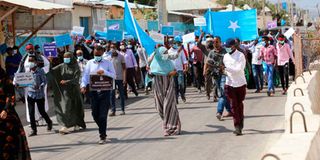Somalia election timelines still a headache for leaders, one year on

Opposition supporters demonstrate in Mogadishu on February 19, 2021 to demand elections.
What you need to know:
- The country has been conducting dragged elections for the Lower House, one of the chambers of the bicameral federal parliament.
- Since mid-2020, Somali leaders have been striving to secure a formula and processes to hold elections.
Somalia’s pursuit of a complete election before the end of 2021 appears to be another missed target, more than 360 days since the initial timelines were imposed.
And with just two days to the self-imposed deadline of December 26, leaders in Mogadishu appear resigned that that will be difficult to meet. However, at least they are now showing intent to discuss the matter and agree on a new, changed timeline.
Since November, the country has been conducting dragged elections for the Lower House, one of the chambers of the bicameral federal parliament, and which is also known as the House of the people. This chamber is supposed to be filled with 275 legislators, from the five federal states as well as northern regions also known as Somaliland.
So far, only South West has conducted some polls, albeit with controversy accompanying the results. Jubbaland, another federal state announced slots for elections, inviting candidates to bid, but has yet to indicate when the polls will start.
This dragging, and complaints of rigging had forced federal electoral board (FEIT) to initially suggest cancellation of some results where complaints were raised. But the local state electoral managers (SEIT) defied the order and approved the results.
On Thursday, Somalia’s international heavily involved in the rebuilding project urged in-person National Consultative Council (NCC) meeting to help improve an understanding and expediting the electoral process.
“We reiterate our call for full transparency in all related processes” their statement read.
Since mid-2020, Somali leaders have been striving to secure a formula and processes to hold elections. In September 2020 and May 2021 an indirect electoral modality was agreed by the NCC (the Federal Government of Somalia, the five-Federal Member States and the Governorship of the capital Mogadishu).
Nevertheless, implementation has proven to be difficult, dragging on the process.
“We remain fully supportive of any process that is based on and respects the 17 September 2020 and 27 May 2021 agreements,” Somalia’s partners in their statement stated.
“We urge Somalia’s leaders to conclude the electoral process as soon as possible and urge the implementation of necessary enhancements to correct observed shortcomings in order to ensure the outcome will obtain the support and confidence of the Somali people.”
The statement was jointly issued by African Union Mission in Somalia (AMISOM), Belgium, Canada, Denmark, Egypt, Ethiopia, European Union (EU), Germany, Intergovernmental Authority on Development (IGAD), Ireland, Italy, Japan, Kenya, League of Arab States (LAS), Norway, Organization of Islamic Cooperation (OIC), Qatar, Sweden, Switzerland, Turkey, Uganda, United Kingdom, United States and United Nations.
Meanwhile, the Council of Presidential Candidates (CPC), a grouping of top politicians lead by Former President Sharif Sheikh Ahmed announced on Thursday that they welcome Prime Minister Mohamed Hussein Roble’s decision to convene an NCC meeting.
As per a statement issued by PM Roble on Tuesday, the NCC meeting scheduled to take place in Mogadishu on next Monday, 27th of December, will address issues related with the federal elections, especially the election of the House of the People (Lower House of the Parliament), which the opposition presidential hopefuls labeled as being rigged and its process full of irregularities.
Prior to the issuance of the statement on Tuesday, Roble held meeting with three Federal Member State presidents and a virtual meeting with members of the CPC.
Another controversial issue to be cleared is the sacking and replacement of 7 members of the Electoral Dispute Resolution Committee by Roble, a move the committee rejected.
Somalia’s chosen indirect electoral model is supposed to pave the way to elect 275 legislators of the Lower House, each MP by 101 delegates selected by clan elders and related civil society activists.
Over nearly 2 months, November and December 2021, the process has proven quite cumbersome, resulting in the election of just over 2 dozen MPs.
Both the CPC and the international partners as well as the general public in Somalia hope that the next NCC meeting will propel the elections forward.
Somalia’s election season will culminate when the 275 legislators and the already elected 54 senators of the Upper House will jointly hold a session to elect the federal president.
The contest is expected to be a very crowded filed including the incumbent, Mohamed Abdullahi Farmaajo, two former presidents, Sharif Sheikh Ahmed and Hassan Sheikh Mohamoud, ex-Prime Minister Hassan Ali Khaire and many others.





